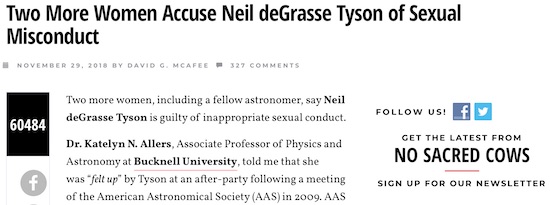I need to get hold of our favorite British solicitor, also known as the first Black dude in Her Majesty’s Secret Service. Does anyone know how I can reach him?
Month: December 2018
Black Science Man Pounded by ME TOO

As a girl, young Katelyn Allers was told (by her father) not to worry about normal aspirations like marriage and family. Instead, dad encouraged her to go get a Ph.D., and settle into a mediocre teaching job at a shit-tier university.
Understandably bitter, after receiving such awful advice which derailed her life, Dr. Allers has decided to get even, by displacing the (natural) animosity toward her father into laughably false accusations against the one celebrity who once wasted a few minutes slumming with her.

A real genius, as the fedora and skank-ho tatts suggest…
Dr. Allers alleges that Neil DeGrasse Tyson “groped” her, is “creepy” and is “a danger to female students.” Dr. Allers knows this because she drunkenly came on to him at a party, and after bothering him for photographs together, he made an unfunny joke about her skanky tattoo.
Another wimminz, one Tchiya Amet (did she assume that name as an adult, or did her parents simply not like her?) is also claiming that Tyson “raped” her. Those claims appear completely unsubstantiated; though here’s a link to her rape fantasy, published some five years ago.
Incidentally, this is what Mizz Amet looks like…

So, what we have are baseless allegations against an autistic goon, who would probably win the prize for least masculine and least threatening man in any room. His accusers are two old, washed-up, hideously ugly wimminz, who suddenly “remember” that he raped them, years earlier.
What we have to be frightened of is the seriousness with which this nonsense is taken, and the real danger to anyone’s reputation.
But, nevermind about that. Let’s learn some science from this hot mama…
My Problems of (with) Theodicy

I happen to know that the minute I post this, people will assume that I’ve suddenly given up my Epicurean impulses, and am on my way down to enlist in the nearest monastery. An educated mind will apprehend the problems with this assumption. If we’re going to indulge in the task of thinking, we have to consider arguments carefully, and work to illuminate the inherent strengths and weaknesses therein.
A typical argument for atheism will often reduce to a discussion about theodicy. Theodicy is a fancy word that describes a presupposed relationship between a necessarily perfect being (God) and the existence of gratuitous evil.
The evil has to be gratuitous. I could argue that God giving me a stomach-ache is evil; but if my upset somehow alerts doctors to an epidemic, and ends up saving the lives of thousands of infants and pensioners, then that evil wasn’t gratuitous. The evil served a purpose, and in the grand scheme of things, that evil was a blessing-in-disguise.
We assume that God is necessarily perfect. If not, we assume (stretching Anselm to his limits) that God is, while imperfect, the closest thing to perfection that exists. Such a being (God) would not inflict gratuitous evil on others. This seems like an uncomplicated proposition.
So, how do we explain ISIS beheadings, the Holocaust, the Holodomor, Bosnian rape camps, or CIA torturers at Guantánamo Bay? How do we explain influenza, athletes foot, and syphilis? It seems, at first, contradictory, to declare the existence of God in the face of so many easy examples.
One problem with this declaration is that it’s proponent assumes a gods-eye-view of history, and necessarily places himself outside the temporal and physical universe. For the atheist to declare that some state-of-affairs X, is gratuitously evil, he’s implicitly declaring that there is no X’, which is good, and for which X is a necessary condition.
Earlier in the week, our brother Honeycomb wrote:
Also .. even if someone can’t prove God exists .. that doesn’t exclude His Omni-presence and Diety. You can’t prove a negative btw.
I can indeed prove a negative. For example: let P := ‘It is not the case that Boxer is presently on the planet Mars.’ Let Q := ‘It is not the case that two and two make twelve-and-a-half.’ Both P and Q are easily proven, via correspondence and coherence.
The problem with proofs of the existence of God is that they don’t easily line up with either the coherence or the correspondence understandings of truth. I could state that there’s a fine, small china teapot that’s orbiting the sun, someplace in the Oort cloud. Skeptics might not be able to prove the teapot’s non-existence, but that doesn’t mean that a sensible person should have credence in the teapot.
I bring this up not to pick apart a brother, but only to disambiguate between my position on theodicy and Honeycomb’s defense of his faith. It’s unreasonable to expect that we can stand outside time and history, and declare that there isn’t some meaningful historical good that will result from evils that we assume are gratuitous, for the same reason that it’s unreasonable to expect the average person to go searching the Oort cloud for Bertrand Russell’s teapot, or Honeycomb’s god.